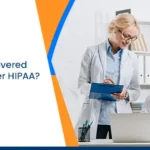HIPAA Rules and Regulations : Who Must Comply

May 23, 2024
The landscape of medical data is expansive and involves several regulations. Amongst them, the Health Insurance Portability and Accountability Act (HIPAA) ensures the confidentiality of patient information. The federal law protects sensitive patient information and sets guidelines for the processing of personal information. HIPAA’s jurisdiction extends across the healthcare spectrum and encompasses healthcare providers, health plans, and healthcare clearinghouses.
Did you know that HIPAA compliance has contributed to a 90.49% decrease in healthcare data breaches? Thus, compliance with HIPAA is critical, from the solo practitioner in your local clinic to the medical institutions in urban centers. Navigating the complex world of healthcare regulations can resemble an intricate puzzle, for some. To help you understand, the blog explores more about who must comply with HIPAA rules and regulations.
Who must comply with HIPAA privacy standards?
HIPAA, or the Health Insurance Portability and Accountability Act, makes rules to keep your health details safe. When it comes to healthcare, several groups must follow these privacy rules to keep your personal medical information safe and secure. HIPSS applies to the following:
1. Healthcare Providers:
Doctors and Nurses: Your family doctors, and nurses who look after your health care.
Clinics and Hospitals: Both small local clinics and big hospitals all belong to this group. They are responsible for ensuring the confidentiality of patient information in every healthcare setting.
Other Healthcare HIPAA covered Entities: Any group or person that gives medical help must follow the rules, making everything similar in healthcare services.
2. Health Plans:
Insurance Companies: HIPAA applies to groups of both companies that sell insurance and government plans. They need to follow HIPAA rules to ensure confidentiality of patient information.
HMOs (Health Maintenance Organizations): This category includes groups that take care of healthcare services for their members.
3. Healthcare Clearinghouses:
Billing Services: Organizations that handle health insurance claims and payments.
Community Health Management Information Systems: Groups look after community health information and data systems to help deliver healthcare.
4. Business Associates:
Billing companies: Billing companies are organizations that manage payment processes for healthcare suppliers.
IT contractors: These are companies that offer technical help and services for healthcare systems.
Consultants: Consultants are people or companies that give advice and services about health.
5. Subcontractors of Business Associates:
Entities Handling Specific Tasks: These could involve people who help with certain parts of a business partner’s job, like saving data or making software.
Maintaining Compliance Down the Chain: Contract workers should follow rules for protecting patient data, ensuring confidentiality of data.
| Entities | Description |
| Healthcare Providers | Doctors, nurses, clinics, hospital practitioners. |
| Health Plans | Insurance companies. |
| Healthcare Clearinghouses | Organizations processing non info like billing services. |
| Business Associates | Entities handling payment processes for healthcare suppliers. |
| Subcontractors of Business Associates and Government Bodies | Entities working in public health agencies, law enforcement, government programs. |
| Researchers | Individuals conducting research activities related to protected health information. |
| Schools and Universities | Entities researching healthcare components within educational institutions and universities. |
Who Does HIPAA Not Apply To?
The Health Insurance Portability and Accountability Act is a law that covers different parts of the healthcare system. But there are some cases or reasons where it doesn’t apply directly.
Employers:
Employment Records: HIPAA typically doesn’t include health details in official job records.
Most schools and school districts:
General Rule: Health records of students maintained by schools don’t fall under HIPAA rules. This includes files kept by the school infirmary.
Exceptions: Some health clinics at schools that are different units giving healthcare services might be part of HIPAA. Educational places that include healthcare, such as a university clinic, might need to follow HIPAA rules.
Law Enforcement Agencies:
Investigative Purposes: Health details used by police to investigate are usually not included under HIPAA rules. The Privacy Act and other rules may control how this information is dealt with.
Correctional Institutions:
Inmate Health Information: People in jail don’t get HIPAA to protect their medical details. Prisons usually have their own rules about health records for prisoners.
Certain government programs:
Federal Employees Health Benefits Program (FEHB): FEHB health information does not have to follow HIPAA rules. But FEHB has its own rules for keeping things private and safe.
Certain research activities:
Research Exemptions: Some studies do not need to follow HIPAA, but all scientists still have rules on how they should act. They also must obey laws made to protect people who take part in their work. Studies that use personal health details may still need to follow rules protecting privacy.
Does HIPAA apply to everyone?
HIPAA, or the Health Insurance Portability and Accountability Act, mostly deals with healthcare places like those that provide medicine services. This act is also connected to groups that help people sign up for coverage when they feel sick, along with firms that clear Medicare payments of charges sent by businesses, in some cases called partners.
It keeps personal health information safe in digital transactions. But HIPAA does not apply to everyone all the time. Exemptions include law enforcement agencies, workplace injury programs, and a few research programs.
Conclusion
While HIPAA regulations are extensive, it is crucial to recognize who must comply with HIPAA and know that not everyone falls under its purview. Insurers, schools, and employers operate with distinct privacy rules. So HIPAA helps keep your medical details safe in certain situations, however does not cover everyone. Trust HIPAA compliance to ensure that everyone’s health information stays secure in the world of healthcare rules.





